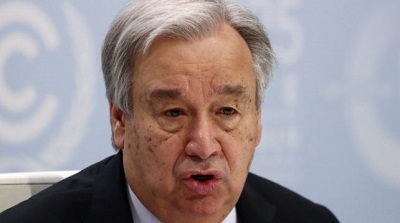United Nations, (Asian independent) UN Secretary-General Antonio Guterres has unveiled a new initiative aimed at integrating fairness, sustainability, and human rights into the procurement and use of essential minerals for the clean energy transition.
The initiative introduces the Panel on Critical Energy Transition Minerals, which unites a diverse group of governments, organizations, and UN bodies. This panel is tasked with developing a set of common and voluntary principles to uphold environmental and social standards in the energy transition, Xinhua news agency reported.
“A world powered by renewables is a world hungry for critical minerals,” Guterres stated on Friday during the panel’s launch.
This initiative, first announced at the COP28 climate summit in Dubai, is poised to present its initial recommendations before the high-level UN General Assembly Week in September. COP28 stands for the 28th meeting of the Conference of the Parties to the United Nations Framework Convention on Climate Change.
The demand for minerals critical to renewable energy technologies, like solar panels, wind turbines, and electric vehicles, is skyrocketing. For example, the UN Trade and Development body predicts that demand for lithium, essential for high-efficiency batteries and electronics, could increase by more than 1,500 per cent.
Such rising demands offer a significant opportunity for many developing countries, particularly in Africa, which holds over a fifth of the global reserves for a dozen metals crucial to the energy transition.
“The race to net zero cannot trample over the poor…the renewables revolution is happening, but we must make sure that it is done in a way that moves us towards justice,” Guterres emphasized, highlighting the potential benefits for developing nations in terms of job creation, economic diversification, and revenue enhancement.
He also stressed the importance of these nations not being relegated to mere suppliers of raw materials within the clean energy value chain.
Guterres further noted, “Little wonder that resource-rich developing countries are calling for urgent action to ensure that they, and their communities, benefit from the production and trade of critical minerals; and that people and nature are protected.”
The panel is co-chaired by Ambassador Nozipho Joyce Mxakato-Diseko of South Africa and Director-General for Energy Ditte Juul Jorgensen of the European Commission. Its membership spans across continents, including Australia, Botswana, Brazil, China, Egypt, India, Japan, Britain and the United States, alongside entities like the African Union, the European Union, UN agencies, and non-governmental organizations.
“This work is extremely complex, but the world cannot wait,” Guterres concluded, reaffirming the UN’s full support for the panel’s mission to ensure a just and equitable clean energy future.








